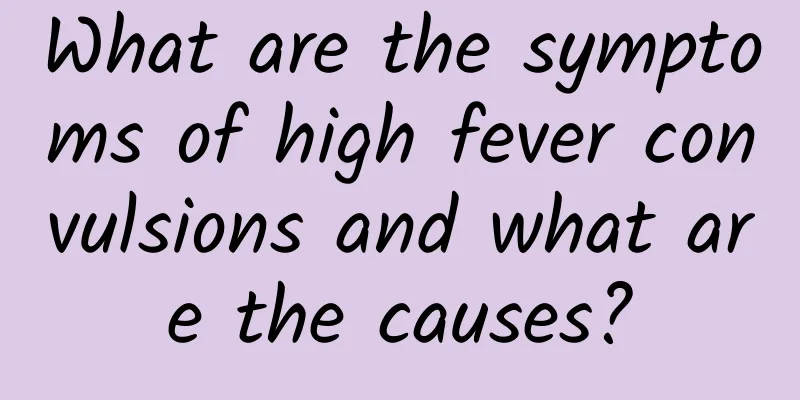What are the symptoms of high fever convulsions and what are the causes?

|
High fever is a common symptom in our lives. Many people will also have a high fever when they have a cold, but many people don’t know the reason why they have convulsions when they have a high fever. Let’s explore it together below! What is a high fever convulsion High fever convulsions are characterized by sudden onset of generalized or localized muscle rigidity and convulsions. High fever convulsions are often accompanied by impaired consciousness. Causes The causes can be divided into two categories: infectious (febrile seizures) and non-infectious (non-febrile seizures) according to the presence or absence of infection. According to the location of the lesion, it can be divided into intracranial and extracranial. (I) Infectious seizures (febrile seizures) 1. Intracranial diseases Viral infections such as viral encephalitis and Japanese encephalitis. Bacterial infections such as purulent meningitis, tuberculous meningitis, brain abscesses, and venous sinus thrombosis. Fungal infections such as new cryptococcal meningitis, etc. Parasitic infections such as cerebral cysticercosis, cerebral malaria, cerebral schistosomiasis, cerebral paragonimiasis, and toxoplasmosis. 2. Extracranial diseases High fever seizures, toxic encephalopathy (severe pneumonia, whooping cough, toxic dysentery, septicemia as primary disease), tetanus, etc. (II) Non-infectious seizures (afebrile seizures) 1. Intracranial diseases Cranial injury such as birth injury, brain trauma, neonatal asphyxia, intracranial hemorrhage. Abnormal brain development such as congenital hydrocephalus, cerebral vascular malformation, macrocephaly (microcephaly), cerebral paralysis and neurocutaneous syndrome. Intracranial space-occupying diseases such as brain tumors and brain cysts. Epileptic syndrome such as grand mal seizures and infantile spasms. Brain degenerative diseases such as demyelinating encephalopathy and macular degeneration. 2. Extracranial diseases Metabolic diseases such as hypocalcemia, hypoglycemia, hypomagnesemia, hyponatremia, hypernatremia, vitamin B1 or B6 deficiency, etc. Genetic metabolic diseases such as glycogen storage disease, galactosemia, phenylketonuria, hepatolenticular degeneration, mucopolysaccharidosis. Systemic diseases such as hypertensive encephalopathy, uremia, heart rhythm disorders, severe anemia, food, drug and pesticide poisoning, etc. Symptoms When normal brain activity is disturbed, a high fever convulsion occurs. There are often no warning signs. During a high fever convulsion, you may experience the following: · Your body becomes stiff or paralyzed · You become unconscious or unable to recognize your surroundings · Your body twitches · You have difficulty breathing |
<<: Do you have cold feet in summer? You should find out the reason!
>>: Do you have large pores and blackheads on your face? 6 tips to improve them
Recommend
Does blood sugar rise after exercise? Most people get it wrong!
Most diabetics know that exercise can play a cert...
What is the cause of the tingling sensation in the lower body?
The genitals of both men and women are very fragi...
What is the normal sperm motility? How to improve sperm motility
There are many standards for measuring sperm qual...
Small pimples on the base of male genitals
Men are the backbone of a family. The premise of ...
4 Dietary Methods to Help Men Strengthen Their Kidneys
Now, some men always feel that their penis is not...
Men with gray hair here indicate kidney deficiency
Kidney health is what men value most. Men often u...
What are the dangers of high semen white blood cells?
Before the couple prepares to have a baby, it is ...
The left testicle droops more than the right one
Generally speaking, testicular ptosis is normal. ...
What to do about enlarged pores in summer? There are ways for men to shrink pores
In the hot summer, men sweat more easily than in ...
Acupuncture points for impotence
Many people may have heard of impotence, which is...
What are the symptoms of eczema acuminatum in men?
The summer is too hot and men's underwear is ...
5 details to make men's kidneys no longer "weak"
Although many men pay attention to this issue and...
The man ate too many oysters at night
Many people like to choose to have a big meal at ...
Is male eczema easy to treat?
Condyloma acuminatum is a relatively serious sexu...
How to treat prostate hyperplasia?
Prostatic hyperplasia, formerly known as prostati...









